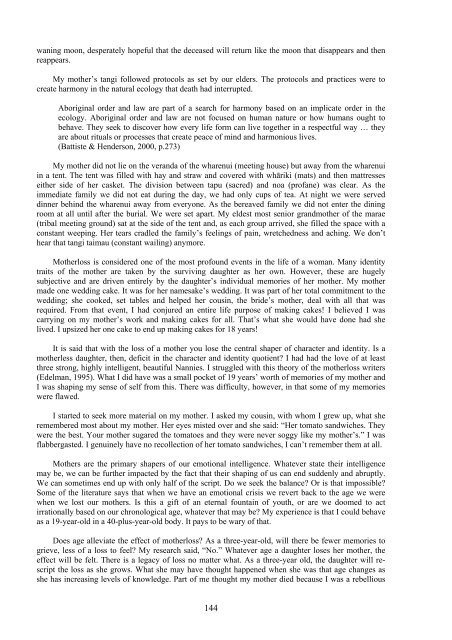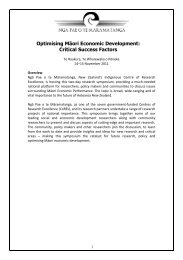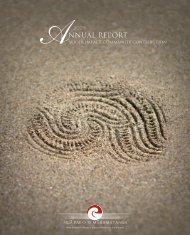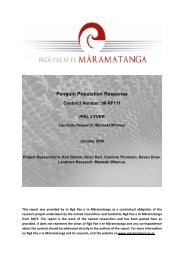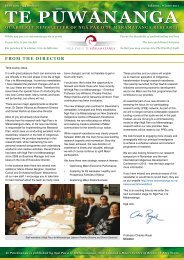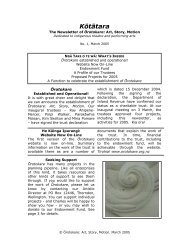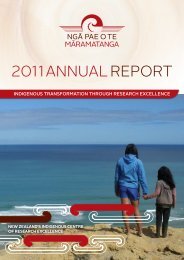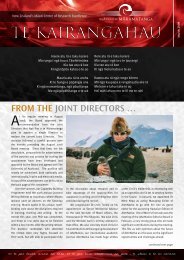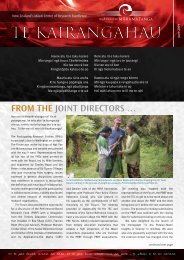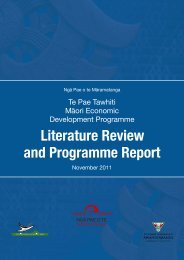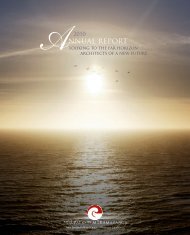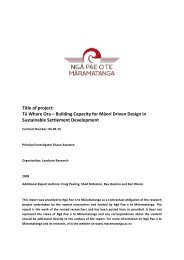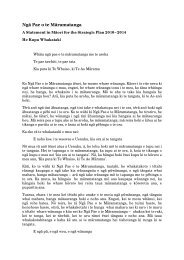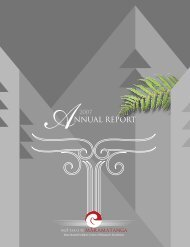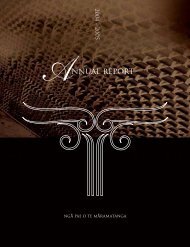traditional knowledge conference 2008 te tatau pounamu
traditional knowledge conference 2008 te tatau pounamu
traditional knowledge conference 2008 te tatau pounamu
Create successful ePaper yourself
Turn your PDF publications into a flip-book with our unique Google optimized e-Paper software.
waning moon, despera<strong>te</strong>ly hopeful that the deceased will return like the moon that disappears and thenreappears.My mother’s tangi followed protocols as set by our elders. The protocols and practices were tocrea<strong>te</strong> harmony in the natural ecology that death had in<strong>te</strong>rrup<strong>te</strong>d.Aboriginal order and law are part of a search for harmony based on an implica<strong>te</strong> order in theecology. Aboriginal order and law are not focused on human nature or how humans ought tobehave. They seek to discover how every life form can live together in a respectful way … theyare about rituals or processes that crea<strong>te</strong> peace of mind and harmonious lives.(Battis<strong>te</strong> & Henderson, 2000, p.273)My mother did not lie on the veranda of the wharenui (meeting house) but away from the wharenuiin a <strong>te</strong>nt. The <strong>te</strong>nt was filled with hay and straw and covered with whāriki (mats) and then mattresseseither side of her casket. The division between tapu (sacred) and noa (profane) was clear. As theimmedia<strong>te</strong> family we did not eat during the day, we had only cups of <strong>te</strong>a. At night we were serveddinner behind the wharenui away from everyone. As the bereaved family we did not en<strong>te</strong>r the diningroom at all until af<strong>te</strong>r the burial. We were set apart. My eldest most senior grandmother of the marae(tribal meeting ground) sat at the side of the <strong>te</strong>nt and, as each group arrived, she filled the space with aconstant weeping. Her <strong>te</strong>ars cradled the family’s feelings of pain, wretchedness and aching. We don’thear that tangi taimau (constant wailing) anymore.Motherloss is considered one of the most profound events in the life of a woman. Many identitytraits of the mother are taken by the surviving daugh<strong>te</strong>r as her own. However, these are hugelysubjective and are driven entirely by the daugh<strong>te</strong>r’s individual memories of her mother. My mothermade one wedding cake. It was for her namesake’s wedding. It was part of her total commitment to thewedding; she cooked, set tables and helped her cousin, the bride’s mother, deal with all that wasrequired. From that event, I had conjured an entire life purpose of making cakes! I believed I wascarrying on my mother’s work and making cakes for all. That’s what she would have done had shelived. I upsized her one cake to end up making cakes for 18 years!It is said that with the loss of a mother you lose the central shaper of charac<strong>te</strong>r and identity. Is amotherless daugh<strong>te</strong>r, then, deficit in the charac<strong>te</strong>r and identity quotient? I had had the love of at leastthree strong, highly in<strong>te</strong>lligent, beautiful Nannies. I struggled with this theory of the motherloss wri<strong>te</strong>rs(Edelman, 1995). What I did have was a small pocket of 19 years’ worth of memories of my mother andI was shaping my sense of self from this. There was difficulty, however, in that some of my memorieswere flawed.I star<strong>te</strong>d to seek more ma<strong>te</strong>rial on my mother. I asked my cousin, with whom I grew up, what sheremembered most about my mother. Her eyes mis<strong>te</strong>d over and she said: “Her tomato sandwiches. Theywere the best. Your mother sugared the tomatoes and they were never soggy like my mother’s.” I wasflabbergas<strong>te</strong>d. I genuinely have no recollection of her tomato sandwiches, I can’t remember them at all.Mothers are the primary shapers of our emotional in<strong>te</strong>lligence. Wha<strong>te</strong>ver sta<strong>te</strong> their in<strong>te</strong>lligencemay be, we can be further impac<strong>te</strong>d by the fact that their shaping of us can end suddenly and abruptly.We can sometimes end up with only half of the script. Do we seek the balance? Or is that impossible?Some of the li<strong>te</strong>rature says that when we have an emotional crisis we revert back to the age we werewhen we lost our mothers. Is this a gift of an e<strong>te</strong>rnal fountain of youth, or are we doomed to actirrationally based on our chronological age, wha<strong>te</strong>ver that may be? My experience is that I could behaveas a 19-year-old in a 40-plus-year-old body. It pays to be wary of that.Does age allevia<strong>te</strong> the effect of motherloss? As a three-year-old, will there be fewer memories togrieve, less of a loss to feel? My research said, “No.” Wha<strong>te</strong>ver age a daugh<strong>te</strong>r loses her mother, theeffect will be felt. There is a legacy of loss no mat<strong>te</strong>r what. As a three-year old, the daugh<strong>te</strong>r will rescriptthe loss as she grows. What she may have thought happened when she was that age changes asshe has increasing levels of <strong>knowledge</strong>. Part of me thought my mother died because I was a rebellious144


